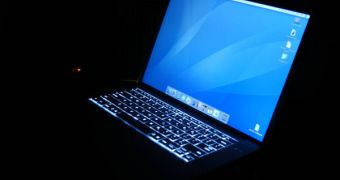A new study committed by Intel has revealed that companies lose a tremendous amount of money with each laptop they give to employees that gets lost, irretrievably damaged, or stolen. On average, alongside the costs of the machine itself, each firm loses $49,246 in lost data, sensitive company information, account details and other materials. The five-month study, conducted by the Ponemon Institute, has examined 138 cases of laptops suddenly becoming unavailable, for one reason or another.
“It is the information age, and employees are carrying more information on their laptops than ever before. With each lost laptop, there is the risk that sensitive data about customers, employees and business operations will end up in the wrong hands,” the analysis report that the Michigan-based Ponemon Institute conducted for Intel argued. The Institute regularly studies organizational data-management practices for various companies. For the new studies, it has looked at businesses in the private sector, but also at a few government agencies.
The experts have learned that the biggest expense recorded in the study, $39,297, was due to breached data, while $5,871 were lost for intellectual property. The team has argued that encrypting the data on a laptop lowers the average lost sums by up to $20,000, which means that the original investment in having the machine remain accessible only to authorized personnel is well worth it. The report has also shown that an additional way of reducing costs is to spot the disappearance / theft within 24 hours, in which case the company will only lose an average of $8,950. It has warned that, if the laptop is not retrieved within a week, then costs could amount to as high as $115,849.
Talking about the business of making laptops more secure, in which many new companies are getting themselves involved, mobile data-protection product analyst John Girard said that, “It is a growing industry. There's a sizable number of systems used in business that have no data protection at all. There's quite a bit of opportunity to sell in this space.” Intel is directly interested in having this class of products as secure as possible, so as to make more and more people buy them. A large share of this market heavily relies on the microprocessor chips that Intel creates, with the other part of the market being owned by chip-manufacturer AMD.
(c) 2009, San Jose Mercury News (San Jose, Calif.), via PhysOrg

 14 DAY TRIAL //
14 DAY TRIAL //